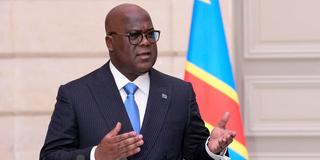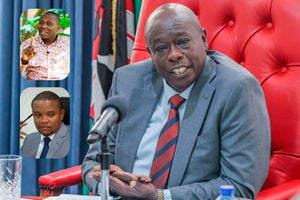DRC, Rwanda signal readiness for new talks – with conditions

President Felix Tshisekedi of the Democratic Republic of Congo.
What you need to know:
- According to the UN report, Rwanda has between 3,000 and 4,000 forces in eastern Congo, operating alongside the M23.
- Last month in Luanda, a ceasefire agreement was brokered after a meeting between the DRC and Rwanda foreign ministers.
Democratic Republic of Congo (DRC) and Rwanda say they are willing to resume talks on long-term ceasefire in the east of Congo, but are issuing old conditions that have themselves fuelled the conflict.
This week, Congolese President Félix Tshisekedi received his Angolan counterpart João Lourenço, the mediator of the Luanda Process who handed him the Proposal for a Peace Agreement.
The 40-minute meeting at the at the Cité de l'Union africaine in Kinshasa discussed the need for peace to return to DRC via the Luanda process, whose roadmap has established a ceasefire deal since August 4.
Kinshasa pledged to support the peace bid, but with a call on Rwanda to stop supporting the M23 rebels, whom the government considers terrorists.
Congolese Deputy Prime Minister for defence Guy Muadiamvita said that “the armed forces of the Democratic Republic of Congo have faced attacks from the M23 coalition despite the ceasefire,” but committed to abiding by the deal.
President Paul Kagame of Rwanda, who also received the Proposal, blamed the DRC and the international community for refusing to see the Rwandese rebel group FDLR as the cause of the war in the eastern DRC.
While he agreed that working together can solve the security problem, he said Kigali sees the FDLR as the biggest problem.
“The FDLR problem is one that weighs heavily on us. For us it is a serious security matter, it is a long-term issue we have to address,” he said in Kigali after swearing in Prime Minister Edouard Ngirente and new members of parliament.
FDLR are remnants of the perpetrators of the 1994 genocide against the Tutsi. Having fled into eastern DRC, they are accused of planning attacks on Rwanda.
A panel of UN Experts has recently accused Rwanda of deploying troops illegally into the DRC, besides backing M23 with training and other support.
“And from there they say, you should remove RDF (Rwanda Defence Forces) from Congo. The question is, what necessitated RDF to go to Congo?” Kagame said.
“If you know what took it there, and you are sure it is there, then solve that problem that took them there. After you have done that then you can ask me why RDF is still in Congo, yet the problem has been solved.”
According to the UN report, Rwanda has between 3,000 and 4,000 forces in eastern Congo, operating alongside the M23, which has been making major advances. Kigali has refuted these figures.
The FDLR-M23 conundrum has been a continual one, but the two sides have lately agreed to talk more about peace.
Last month in Luanda, a ceasefire agreement was brokered after a meeting between the DRC and Rwanda foreign ministers, under the auspices of the Angolan government.
But on August 4, the day the deal was supposed to take effect, M23 rebels – who have seized territory in the east since launching a new offensive at the end of 2021 – captured a town on the border with Uganda.
The UN mission, Monusco, strongly condemned the violation of the ceasefire saying it compromised stabilisation efforts in the region and runs counter to the agreement signed in Luanda on July 30.
The Catholic Church also expressed its concern over the situation in east DRC.
On Tuesday, the National Episcopal Conference of Congo (Cenco) urged respect for the ceasefire agreement “so that it does not remain a dead document like previous accords.”
“All previous agreements have been violated, and have not been met with any sanctions,” the bishops observed.
While giving his inauguration speech a last week, President Kagame said that “peace cannot be delivered by anyone from anywhere no matter how powerful, if the party most directly concerned does not do what is needed.”
“Without that, the sincere mediation efforts by the mandated regional leaders cannot work as intended.”
The Angolan leader, having made trips to Kigali and Kinshasa this week, said that both sides are ready for talks again on August 20.
The Kinshasa meeting between Lourenço and Tshisekedi came less than a week after the meeting between the heads of the DRC and Rwandan security services, also in Luanda.
Thérèse Kayikwamba, DRC's Minister for Foreign Affairs, said Tshisekedi had given his firm commitment to observe the ceasefire.
"President Félix Tshisekedi reiterated the Congolese government's full readiness to participate in all the next stages of the Luanda Process under the auspices of mediator João Lourenço. We are in an encouraging dynamic in which the ceasefire is widely observed,” she said after the meeting on August 13.
“We are maintaining this positive momentum because we reiterate that the ceasefire will create the right conditions for us to tackle the underlying problems,” she added.
Angolan Foreign Minister Téte António, however, indicated that more monitoring of the ceasefire was needed. He said an ad hoc verification mechanism would be strengthened to monitor violations.
Since the ceasefire meeting held in Luanda on July 30 between the Rwandan and Congolese foreign ministers, a number of initiatives have also followed to pursue the effort for peace in the DRC.
On August 15, intelligence experts from the two sides were expected to submit their report to the ministerial meeting.
The upcoming August 20-22 ministerial meeting in Luanda aims at essentially addressing the lasting peace proposal submitted to the parties, “with a view to reaching a common understanding on a negotiated and peaceful solution to the conflict prevailing in the eastern region of the DRC, which has worsened since the end of 2023,” Angola’s presidency said on Thursday.





